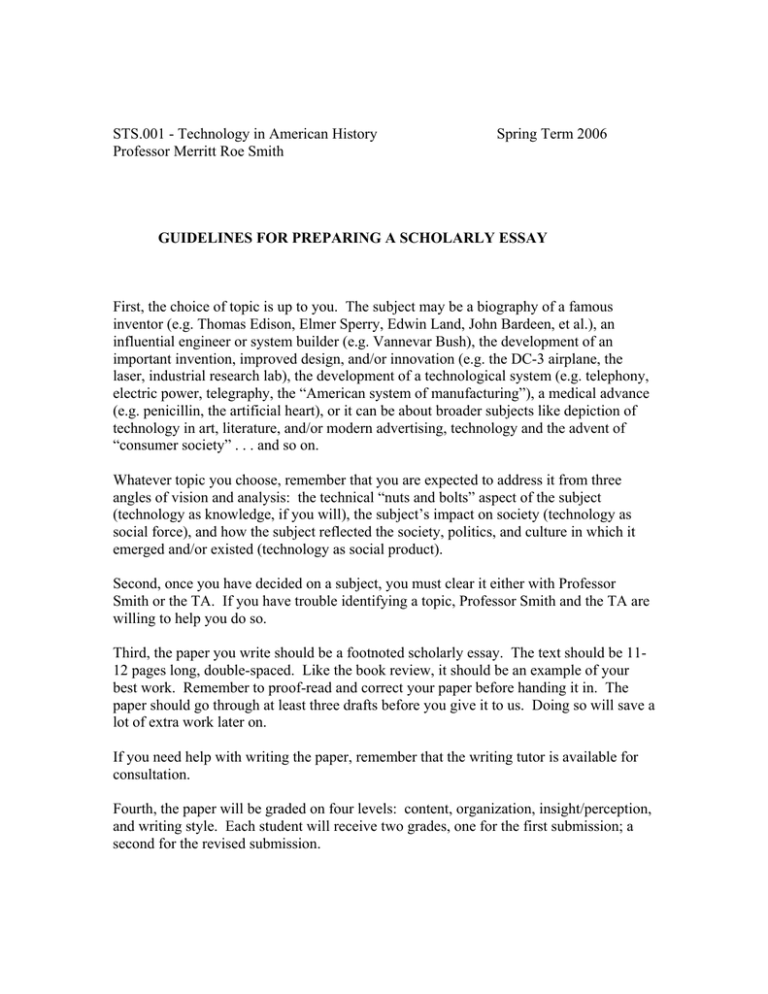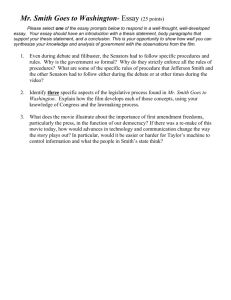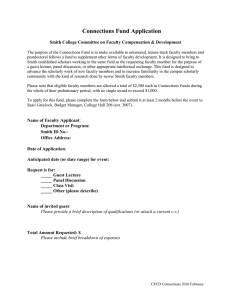STS.001 - Technology in American History Spring Term 2006
advertisement

STS.001 - Technology in American History Professor Merritt Roe Smith Spring Term 2006 GUIDELINES FOR PREPARING A SCHOLARLY ESSAY First, the choice of topic is up to you. The subject may be a biography of a famous inventor (e.g. Thomas Edison, Elmer Sperry, Edwin Land, John Bardeen, et al.), an influential engineer or system builder (e.g. Vannevar Bush), the development of an important invention, improved design, and/or innovation (e.g. the DC-3 airplane, the laser, industrial research lab), the development of a technological system (e.g. telephony, electric power, telegraphy, the “American system of manufacturing”), a medical advance (e.g. penicillin, the artificial heart), or it can be about broader subjects like depiction of technology in art, literature, and/or modern advertising, technology and the advent of “consumer society” . . . and so on. Whatever topic you choose, remember that you are expected to address it from three angles of vision and analysis: the technical “nuts and bolts” aspect of the subject (technology as knowledge, if you will), the subject’s impact on society (technology as social force), and how the subject reflected the society, politics, and culture in which it emerged and/or existed (technology as social product). Second, once you have decided on a subject, you must clear it either with Professor Smith or the TA. If you have trouble identifying a topic, Professor Smith and the TA are willing to help you do so. Third, the paper you write should be a footnoted scholarly essay. The text should be 1112 pages long, double-spaced. Like the book review, it should be an example of your best work. Remember to proof-read and correct your paper before handing it in. The paper should go through at least three drafts before you give it to us. Doing so will save a lot of extra work later on. If you need help with writing the paper, remember that the writing tutor is available for consultation. Fourth, the paper will be graded on four levels: content, organization, insight/perception, and writing style. Each student will receive two grades, one for the first submission; a second for the revised submission. Fifth, source materials. Whatever topic you select, you must consult at least four source materials beyond the required textbooks for this class. In other words, some basic research is required before you write the paper. Books, articles from scholarly journals, newspaper and magazine articles are acceptable sources. The use of primary manuscript/archival sources is encouraged but not required. Encyclopedias like the World Book do not count, nor will special websites unless they are discussed first and approved by Professor Smith or the TA. Your use of source materials will be taken into account by the instructors and will comprise part of the grade assigned for the “content” portion of the essay. You are strongly encouraged to consult with the TA about finding good sources. Oftentimes the best materials are tucked away in publications that are very hard to find. The TA is ready and willing to help you with your search. Finally, footnoting. The purpose of a footnote is to indicate to the reader where you acquired the information you are using. You don’t have to footnote everything. However, direct quotations must always be footnoted. So should important pieces of information that are critical to your argument, as should anything you believe the reader might want to know more about upon reading your essay. In other words, footnotes should be used to document your essay and to point the reader to the sources you are using in case s/he wants to check your facts and/or consult them for further information. Some example footnotes follow. STS.001 - Technology in American History Professor Merritt Roe Smith Spring Term 2006 Example Footnotes Books Book by a Single Author, First Edition: 1. Donald N. McCloskey, Enterprise and Trade in Victorian Britain: Essays in Historical Economics (London: George Allen and Unwin, 1981), 54. Book by a Single Author, Later Edition: 2. Donald N. McCloskey, The Applied Theory of Price, 2nd ed. (New York: Macmillan, 1985), 24. Book by Two or Three Authors: 3. Donald A. Lloyd and Harry R. Warfel, American English and Its Cultural Setting (New York: Alfred A. Knopf, 1956), 12. [If there is a third author, follow this example: James Smith, Donald Marc, and Jack Jones.] Book by More than Three Authors: 4. Martin Greenberger et al., eds., Networks for Research and Education: Sharing of Computer and Information Resources Nationwide (Cambridge: MIT Press, 1974), 50. Book by an Unknown Author: 5. College Bound Seniors (Princeton: College Board Publications, 1979), 1. Book with Both an Author and an Editor or Translator: 6. Helmut Thielicke, Man in God's World, trans. and ed. John W. Doberstein (New York: Harper and Row, 1963), 12. An Anthology: 7. Poetical Works of William Wordsworth, ed. E. de Selincourt and H. Darbishire, 2nd ed., vol. 2 (Oxford: Oxford University Press, 1952), 10. Chapter in an Edited Collection: 8. Ernest Kaiser, "The Literature of Harlem," in Harlem: A Community in Transition, ed. J. H. Clarke (New York: Citadel Press, 1964), 64. Reprinted Book: 9. Gunnar Myrdal, Population: A Problem for Democracy (Cambridge: Harvard University Press, 1940; reprint, Gloucester, MA: Peter Smith, 1956), 9. Articles Article in a Journal: 10. Louise M. Rosenblatt, "The Transactional Theory: Against Dualisms," College English 54 (1993): 380. Book Review: 11. Steven Spitzer, review of The Limits of Law Enforcement, by Hans Zeisel, American Journal of Sociology 91 (1985): 727. Newspaper Article: 12. Tyler Marshall, "200th Birthday of Grimms Celebrated," Los Angeles Times, 15 March 1985, sec. 1A, p. 3. ["p." is used to make clear the difference between the page and section numbers.] Other Government Document: 13. Congressional Record, 71st Cong., 2nd sess., 1930, 72, pt. 10:10828:30. Unpublished Material (Dissertation or Thesis): 14. James E. Hoard, "On the Foundations of Phonological Theory" (Ph.D. diss., University of Washington, 1967), 119. Interview by Writer of Research Paper: 15. Charles M. Vest, interview by author, Cambridge, Massachusetts, 1 December 1992. For more examples see: Kate L. Turabian, A Manual for Writers of Term Papers, Theses, and Dissertations (Chicago: University of Chicago Press, 1996).


